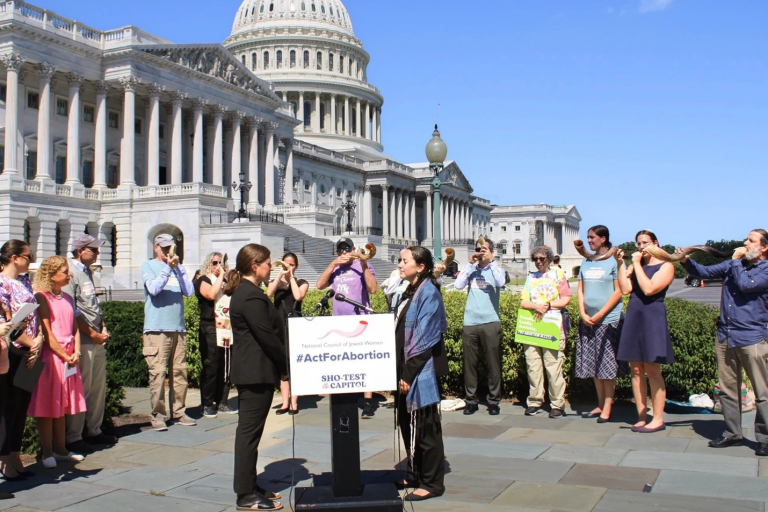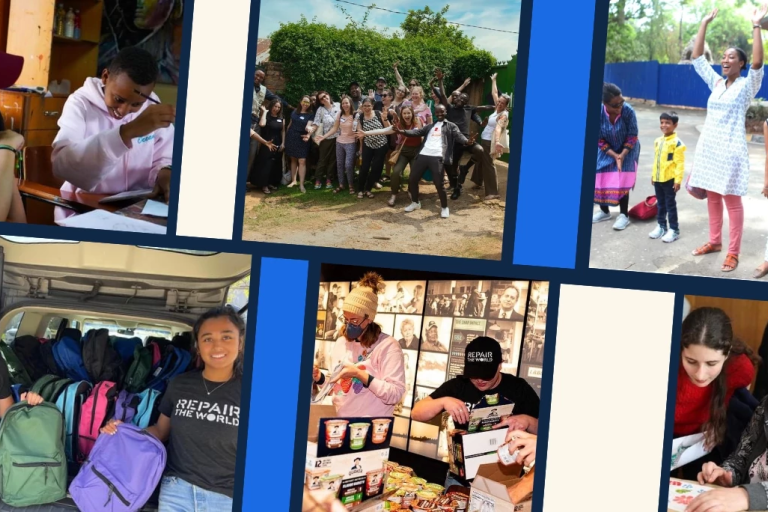Published
August 29, 2013
Tags
 Elyssa Moss Rabinowitz, an ROI community member, directs Kol HaOt, a venture dedicated to conveying Jewish ideas, texts and values through the arts. Through her work in Jerusalem, Elyssa creates worlds of Jewish meaning and beauty by using all forms of media and creates interactive, participatory events and programs of Jewish content for institutions and families.
Elyssa Moss Rabinowitz, an ROI community member, directs Kol HaOt, a venture dedicated to conveying Jewish ideas, texts and values through the arts. Through her work in Jerusalem, Elyssa creates worlds of Jewish meaning and beauty by using all forms of media and creates interactive, participatory events and programs of Jewish content for institutions and families.
In a few days we’ll celebrate Rosh HaShanah, one of my favorite holidays. It usually falls just as my kids have gone back to school and we’re all gearing up for a new year. It is a time of renewal and of family – always filled with good food, festive traditions and wishes, hopes and prayers for the future.
There’s an age old tradition amongst Jewish communities all over the world, which uses clever word play to connect eating certain foods with well wishes for the new year. My own family and I enjoy many of them. Of course, the best known is dipping apples in honey to symbolize our hope for a sweet new year. But we also get a little creative. One of our not-so-traditional favorites is to take a piece of lettuce, half a raisin and a piece of celery and proclaim: “Let us have a raise in salary!” (Think about it!)
But Rosh HaShanah also has its deeper side.
While the holiday is best known by the name “Rosh HaShanah,” which literally means “head of the year,” in the Torah the holiday is called “Zichron Tru’ah,” which roughly translates as “Memory Blast” and in many traditional sources the holiday is referred to as “Yom HaZikaron” or “The Day of Remembrance.” Additionally, the only mitzvah, or commandment, that is directly connected with this holiday is mentioned in the same verse - to hear the blast of the shofar.
“In the seventh month, on the first day of the month, you shall observe complete rest, a memorial proclaimed with the blast of horns, a holy occasion.” -Leviticus 23:24
This leads me to wonder, why is the Jewish New Year actually a memorial day? And why is the only commandment of this day to listen to a simple blast from a ram’s horn? What is the connection between the two?
According to tradition, on Rosh HaShanah the past is brought to the fore, and God remembers us, our deeds and our actions. But I believe God isn’t the only one who remembers; this is a time when we can also “remember ourselves.”
Intertwined with memory is an element of judgment, a defining characteristic of Rosh HaShanah. By remembering, I compare between the past and the present, between my hopes and expectations and the way they played out in reality. I don’t just think of the past, I re-live it. When I remember the people, the places and the experiences that impacted me the most, I am whisked back to that moment and I experience it once again.
We may find that in the race of time, we have gotten too far away from our true selves, from what we used to be. We may find ourselves “asleep,” off our path or lost in daily life. We are busy running from one thing to the next, but we don’t have the opportunity to stop and do a reality check. Are we living out our values? Do we remember where we’re going and why we’re doing what we’re doing? For whom? For what? Do our lives look the way we want them to?
According to Maimonides, the great 12th century Spanish Jewish thinker, this is the purpose of the blowing of the shofar on Rosh HaShanah. That strong, piercing and utterly simple blast serves as an awakening, a spiritual alarm clock. It grabs our attention just in time to remind us that something is happening. It is a day of judgement. Where are you? Where have you been? This blast wakes up our memory, our expectations and our hopes.
Hassidic tradition teaches that the sound of the shofar comes from a world before words. It shouts out from a primordial foundation, from the beginning of humanity like a child wailing before she learns to speak. These sounds call us to wake up, to return and to remember where we started and where we want to go.
Rosh HaShanah is an opportunity to check in, to reflect, to regain consciousness and the shofar serves as the restart button that begins that process. No words, just silence broken by a strong, primal sound.
As we enter Rosh HaShanah, which takes place next week from sundown on Wednesday, September 4 through sundown on Friday, September 6 (leading straight into Shabbat this year), I encourage you to try to focus on memory and judgment. If you need a little help awakening, try to find a place where you can hear the blasts of a shofar.
Once you’ve woken up, don’t forget to celebrate, eat symbolic and yummy foods, and share your wishes for a sweet and meaningful new year.
Shana Tova!




